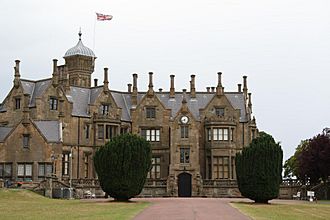Brownlow House facts for kids
Quick facts for kids Brownlow House |
|
|---|---|

Brownlow House in 2010
|
|
| General information | |
| Architectural style | Elizabethan |
| Town or city | Lurgan |
| Country | Northern Ireland |
| Coordinates | 54°27′57″N 6°19′43″W / 54.4658°N 6.3285°W |
| Completed | 1833 |
| Cost | Approx |
| Design and construction | |
| Architect | William Henry Playfair |
Brownlow House, also called Brownlow Castle or Lurgan Castle, is a very old and important house in Lurgan, Northern Ireland. It was built in the 1800s. A Scottish architect named William Henry Playfair designed it for Charles Brownlow, 1st Baron Lurgan. He was an important person in Irish politics. The house was even used by soldiers during both big world wars.
Contents
History of Brownlow House
Building the House
Brownlow House was built in 1833. It was designed by a Scottish architect named William Henry Playfair. The house was made for Charles Brownlow, 1st Baron Lurgan and his family. He was a well-known politician from Ireland.
Changing Owners
The Brownlow family owned the house for many years. Then, in the early 1900s, a company bought it. Later, a local group called Lurgan Loyal Orange District Lodge bought the property. They still own Brownlow House today.
Brownlow House in World Wars
The house played a big part in the 20th century's world wars. During the First World War, it was a main office. Two army groups, the 16th Battalion Royal Irish Rifles and the 10th Battalion Royal Irish Fusiliers, used it. In World War II, American soldiers used Brownlow House as their base.
Restoring the House
In 1996, the building was badly damaged by a fire. An architectural company from Lurgan helped fix it. An expert who worked on the 1992 Windsor Castle fire also helped with the repairs. This made sure the house was restored carefully.
Museum and Exhibitions
In 2014, a museum opened in the basement of Brownlow House. It tells the story of the house's role in World War I. In August 2015, a new exhibition was added. This part shows how the house was used in World War II. It also highlights how Northern Ireland helped the British and American armies.
 | Roy Wilkins |
 | John Lewis |
 | Linda Carol Brown |

